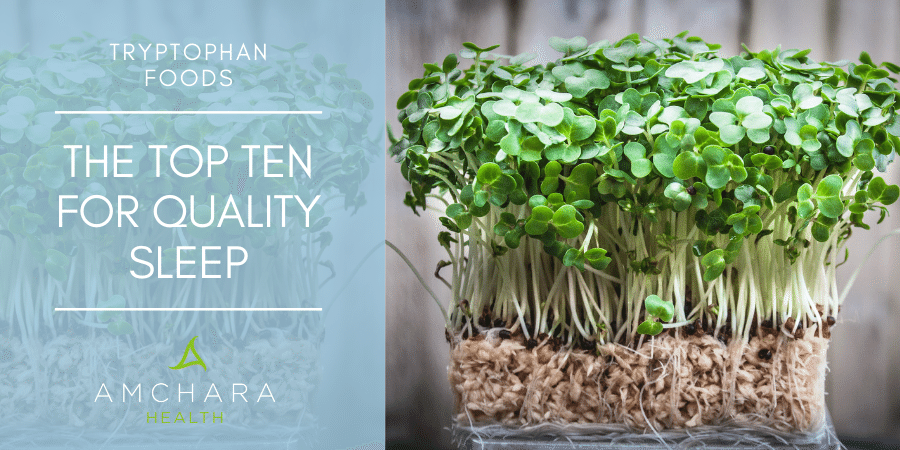Topics Covered in this article:
Falling asleep, staying asleep and enjoying deep restorative sleep is controlled by a complex network of neurotransmitters, enzymes and hormones in the brain.
Chemicals such as tryptophan are one of the key substances implicated in the sleep-wake cycle, but how do you make sure your body is producing enough?
We always take an evidence-based approach and in this article we discuss what tryptophan is, how it influences your sleep and how to maximise the uptake of this important neurotransmitter.
We also give you a handy guide to the top ten foods containing the highest levels of tryptophan.
What is Tryptophan?
Tryptophan is one of nine essential amino acids, which must be sourced from protein in the food we eat. (1)
Humans have relatively low tryptophan storage and, compared to other amino acids, tryptophan has the lowest overall concentration in the body.
Performing many vital roles, one of tryptophan’s most important functions is as the starting point for the production of the neurotransmitters serotonin and melatonin. (3)
Tryptophan acts as a substrate, which is converted to serotonin in the gut and brain, and melatonin in the pineal gland. (4)
Serotonin is particularly important as it is key to the activities of many other brain compounds including those that govern your state of alertness, ability to fall asleep, mental activity and muscle movements.
There are many potent serotonin-active drugs that have been developed over the years to treat headaches, enhance mood regulation, control appetite, relieve anxiety, ease muscular and skeletal pain and promote sleep.
Melatonin is another primary hormone involved in sleep regulation.
In fact it is melatonin that determines your sleep-wake cycle, otherwise known as the circadian rhythm.
Because serotonin and melatonin production are so vital for sleep regulation, serotonin synthesis is one of the most important tryptophan pathways.
Studies show that deliberately lowering tryptophan levels in primary insomniacs has an adverse effect on their sleep continuity. (5)
Further data, collected from over 29,000 US adults to determine the effects of a daily dose of 826mg of tryptophan on liver, kidney and mental function, concluded that a high intake of tryptophan was positively associated with sleep duration. (6)
How to Maximise Tryptophan Uptake
As adults age there is a tendency to produce less melatonin.
Fortunately, there are ways to overcome both serotonin and melatonin deficiency.
This can be achieved by providing the correct support for tryptophan metabolism.
A poor diet, lack of exercise, toxic substances such as alcohol, cigarettes and caffeine and overall physical and emotional stress can rob the brain of the ability to make enough serotonin and melatonin to meet your body’s demands.
It is the balance of amino acids in the bloodstream that determines the metabolism of tryptophan, which in turn is determined by the types of food you eat.
Compared to other amino acids, the quantity of tryptophan found in foods is very small.
Hours after eating a protein based meal, there will be high levels of many amino acids – all competing to cross the blood-brain barrier into the brain.
Tryptophan can only be transported across the blood-brain barrier by a specific carrier protein, also responsible for delivering the amino acids, isoleucine, phenylalanine, leucine, valine and tyrosine.
The odds of tryptophan uptake are pretty low.
The solution to this is to eat a high carbohydrate meal, which can increase the tryptophan available to the brain.
Carbohydrates don’t change the levels of circulating tryptophan, but they do decrease the concentrations of other amino acids, through the activation of insulin.
Insulin diverts other amino acids to muscles but leaves tryptophan untouched, increasing the relative availability of tryptophan for transport into the brain. (2)
Top Ten Tryptophan Foods
Although eating carbohydrates combined with protein can increase the uptake of tryptophan, including dietary sources of tryptophan in your daily eating plan can have the same effect.
The following foods contain the highest levels of tryptophan. (7)
- Game meat
- Seaweed, spirulina
- Spinach
- Soy protein
- Sesame seeds
- Crab meat
- Halibut
- Shrimps
- Pork
- Watercress
Lesser amounts can also be found in turkey, chicken, egg whites, cottage cheese, turnips and a variety of fish.
-
How Much Tryptophan Do You Need?
Only small amounts are necessary for general healthy nutrition.
The recommended daily allowance for adults is estimated to be between 250 mg/day and 425 mg/day.
In terms of food on your plate, one cup of frozen spinach contains approximately 690mg of tryptophan and 8oz of halibut contains around 593mg.
Take home message
Gaining adequate protein from a variety of high quality sources will ensure a good supply of essential amino acids.
Protein is necessary for the structure of almost every molecule in the body, particularly hormones, enzymes and neurotransmitters, so to benefit your brain function and sleep quality, don’t skimp on the protein.
There’s no need to struggle with sleep, regardless of the causes.
Amchara’s Personalised Health practitioners can give you their expert advice on nutrition and lifestyle and guide you towards any supplementation or tests that may be required to help you to achieve optimum wellness.
Contact us now for a complimentary consultation with one of the team.
READ THIS NEXT:
- Vitamin D: A Safe And Natural Way To Sleep
- Could a Ketogenic approach to nutrition improve your sleep?
- St John’s Wort: Anxiety Depression And Insomnia
- Enhancing Your Sleep Quality With Magnesium
- 5 Top Tips To Get Better Sleep
- 14 Ways To Sleep Better Naturally
- Sleep: The Impact on Hormones and Your Health




